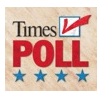MYRTLE BEACH, S.C. — With two wins under his belt, Mitt Romney holds a significant lead among national Republican voters, though there is still room for conservative voters to unite against him and back an alternative to be the GOP presidential nominee, according to the latest The Washington Times/JZ Analytics Poll.
His showing puts him on par with the past three Republican nominees at this point in 1996, 2000 and 2008, and just as striking, he seems to have quelled much of the anyone-but-Romney sentiment that has characterized the race until now.

Only 9 percent of those surveyed chose him as the one candidate they could never vote for — well behind more controversial candidates Rep. Ron Paul of Texas and former House Speaker Newt Gingrich.
Overall, Mr. Romney drew support from 32 percent of those surveyed, followed by Mr. Gingrich and former Sen. Rick Santorum of Pennsylvania each at 17 percent and Mr. Paul at 15 percent. Texas Gov. Rick Perry garnered 3 percent.
“As long as the conservative alternative is split, then there is no conservative alternative,” said John Zogby, the pollster who conducted the survey. “Romney’s numbers are solid and strong. However, they don’t match the combined numbers of the conservatives in the race. But at this point in time, there’s a second war going on. It’s not just Gingrich and Romney, it’s Gingrich and Santorum.”
The candidates were set to square off Monday night in South Carolina ahead of that state’s primary, slated for Saturday, and which conservative activists argue could be decisive in proving whether Mr. Romney’s quest for the nomination can be derailed.
The poll of 500 likely Republican primary voters, which included self-identified Republicans, Democrats and independents who said they would vote in the GOP’s contests, was taken Saturday and Sunday. That was before Jon Huntsman Jr. dropped out of the race Monday morning. Mr. Huntsman polled at less than 4 percent support, chiefly from self-identified moderate voters.
Battle for No. 2
Mr. Romney’s comfortable lead puts pressure on Mr. Gingrich and Mr. Santorum, who are fighting a primary within the primary, battling for the claim of No. 1 contender and the right to go head-to-head with Mr. Romney in the later primaries.
On that score, they each have their strengths. Mr. Santorum is seen as the truest conservative in the race, and a full 21 percent of voters said Mr. Gingrich is the one candidate they would never vote for — twice as high as Mr. Romney and more than three times as high as Mr. Santorum’s rating.
But Mr. Gingrich does have the deepest level of support of any candidate, with more than half of his supporters saying they “definitely” will be voting for him. That’s more than 10 percentage points higher than Mr. Paul, who usually wins contests about the devotion of supporters.
This past weekend, leaders in the religious conservative movement met in Texas and appear to have backed Mr. Santorum as the candidate who can unify them.
But The Times/JZ Analytics Poll showed the two men almost even among self-identified born-again Christians, with Mr. Santorum receiving 21 percent support, a single percentage point higher than Mr. Gingrich.
Mr. Romney beat them both, with 25 percent.
Mr. Paul continues to divide Republicans, with 30 percent of likely primary voters saying he’s the one candidate they could never vote for.
Momentum building
Mr. Romney, though, remains the chief story in the race, in part because he is acquiring an aura of inevitability.
When voters are asked who is best-equipped to beat President Obama in November, the former Massachusetts governor runs away with it, garnering a stunning 41 percent. The next-closest is Mr. Gingrich at 15 percent. Mr. Perry won less than 1 percent.
Even self-identified tea party supporters gave Mr. Romney the edge.
“Romney is seen as the guy to beat Obama. Here I think we pretty much come to a definition of that,” Mr. Zogby said. “It’s very important among solid numbers of tea party people to defeat Obama, and Romney is their man. Even if there may not be love, or they may not believe he’s the truest conservative, when you get closer and closer to people voting, people want to beat Obama.”
Adding to that, 34 percent said Mr. Romney can do the best job of uniting the Republican Party going forward, nearly twice the number who picked Mr. Gingrich, who placed second on that scale.
On the campaign trail Monday, Mr. Huntsman made the same argument as he dropped out of the race.
’Best equipped’ to win
“I believe it is now time for our party to unite around the candidate best equipped to defeat Barack Obama. Despite our differences and space between us on some of the issues, I believe that candidate is Mitt Romney,” Mr. Huntsman said.
When polled about Mr. Romney’s Mormon faith and whether it mattered, 78 percent said it shouldn’t be much of a factor.
Mr. Zogby said Mr. Romney’s position in the race puts him about on par with the last three GOP nominees: John McCain, George W. Bush and Bob Dole. All of them were consolidating their support after New Hampshire’s primary, en route to victories in South Carolina that essentially sewed up the race.
“This is about right for the front-runner,” Mr. Zogby said. “Bush maintained front-runner-hood, and McCain achieved front-runner-hood after New Hampshire. Give or take a few points, this is what winning New Hampshire means.”
• Stephen Dinan can be reached at sdinan@washingtontimes.com.



Please read our comment policy before commenting.